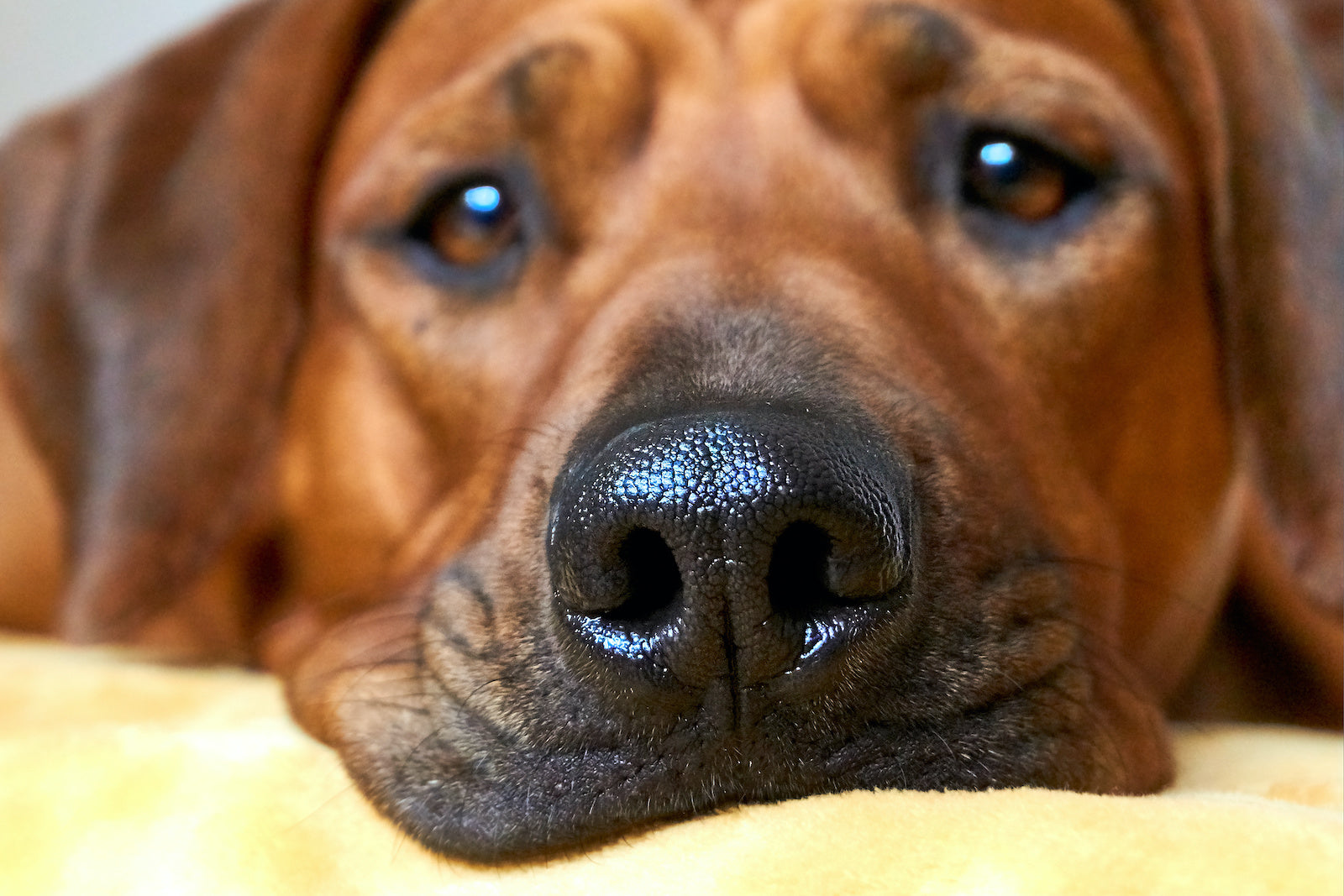While runny noses for humans are usually nothing more than a mild discomfort, a dog runny nose can signal more serious problems. Sometimes, a runny nose is a symptom of an easy to treat issue such as seasonal allergies. Other times, it’s a sign of a condition that needs to be addressed immediately by a qualified veterinarian (DVM).
Either way, it’s difficult for pet owners to watch their furry best friends live with discomfort. Here, we’ll show you the main causes of a dog runny nose from least serious to most concerning. You’ll also find tips on how to treat mild problems at home and how to know when it’s time to see a vet.
Common Causes of a Runny Nose in Dogs

There are many things that can cause a runny nose in dogs. They range from mild irritants, like seasonal allergies, to serious issues. Here are the most common reasons dogs get a runny nose.
Seasonal Allergies
Dogs may develop a runny nose due to seasonal allergies or food allergies. Symptoms of allergic rhinitis in dogs include things like clear discharge from the nose, watery eyes, sneezing, reverse sneezing, constant scratching, and itching.
Dogs may suffer from allergies year-round or only seasonally depending on the irritant. If your dog’s runny nose is caused by allergies, you can typically deal with it at home using natural remedies. If you’re not sure what’s causing your dog’s allergies, a veterinarian can help you find out by conducting allergy testing.
Biology
Some dog breeds suffer from a runny nose simply because of their genetics. Flat-faced dog breeds can have trouble breathing due to the shape of their airways. Dogs like boxers and pugs may suffer from a runny nose when the cartilage in their nasal passage becomes weak. Surgery is the best way to fix these problems, though many dogs live for years with a mild runny nose without any more significant problems.
Foreign Bodies
A dog runny nose can be caused by foreign objects that obstruct the nasal passages. Common obstructions include things like foxtails and grass awns. Symptoms that accompany a foreign object obstruction include sneezing, pawing at the nose, and nose bleeds. The best course of action is to see if you can remove the object from the dog’s nose using tweezers or very small pliers. If you can’t find the object or don’t know if you got it all out, head to the vet.
Infections
Dogs can get a variety of infections including bacterial, fungal, and viral infections as well as nasal mites. Many of these cause a runny nose along with other symptoms, including bad odor, bloody nose, coughing, and choking on mucus. Infections should be diagnosed and treated by a veterinarian. While some are mild and easy to deal with, others may cause complications.
When To Go to the Vet and When To Treat at Home

Some of the causes of runny nose — including seasonal allergies — can be treated at home. Other serious conditions require a veterinarian. Here’s a quick breakdown of what you can do at home.
In general, if your dog has a mild runny nose with clear nasal discharge, you can treat symptoms at home. If your pup’s runny nose is caused by seasonal allergies, try making a few lifestyle changes to reduce exposure to allergens. Take walks midday to avoid high pollen counts in the mornings and evenings. If your dog is allergic to grass, walk on dirt or paved paths, head to the beach, and avoid the dog park. If your dog is allergic to dust or grass, you can also opt to run and play on artificial turf fields.
Use pet wipes to remove irritants from your pet’s fur and use air filters inside your home to remove potential allergens like fragrances. You can also give your dog an antihistamine or an allergy relief chew to help. Immune support chews can also help support a healthy immune system and help with seasonal allergies.
For dogs who suffer from food allergies, try a limited ingredient diet (LID). These diets remove the most common food allergens, including chicken, beef, and dairy. You can slowly reintroduce foods one at a time to see which ingredients are the culprits. Avoid brands that claim to sell hypoallergenic dog foods. Dogs, like humans, can theoretically be allergic to anything so there is no truly hypoallergenic food.
If your dog has a runny nose from a foreign object, try to remove the object using small pliers or tweezers. If you are positive that you removed the entire obstruction, monitor your dog. You'll only need to visit the vet if other symptoms develop. If you’re not sure what your dog inhaled or how much is obstructing the nasal passages, head to the vet.Keep your dog comfortable and try to reduce anxiety with tasty chews and their favorite toys. In a few days or weeks, they should be back to normal. Just follow up with your vet if you have any questions.
Stop the Sniffles and Ease Your Dog’s Runny Nose

Start with diagnosing the underlying causes of nasal discharge. There may be something lodged in your dog’s nostril, he or might be suffering from a bacterial or viral infection, or he may simply have seasonal allergies. There may also be more serious causes affecting your dog’s health.
Knowing when to go to the vet and when to treat at home can make all the difference. Some minor issues, such as seasonal allergies, can be treated at home while other times you’ll need to visit a professional. Now that you understand what to watch out for, you can make an informed decision the next time your pup has a runny nose.













